- Overview
- Trip Outline
- Trip Inclusion
- Trip Exclusion
- Gallery
- Reviews
- Booking
- FAQ
The Trek
Lying above the busy town of Manali, the Hampta circle trek is a stark contrast to everything one experiences in the hill town. It is a relatively easy trail that doesn’t see a lot of footfall, which leaves you to enjoy the peace of the woods, the scenic campsites and the views of mountains like Hanuman Tibba and Friendship peak. You are so close to the city yet so far! As the trek is off Manali, one can always round off the experience by exploring the hill town or Kasol.
The Area
This trek lies in the Kullu valley of Himachal. The Kullu valley is a prime tourist and adventure destination. It’s unparalleled beauty along with easy accessibility has attracted many adventurists. No wonder some call it the Chamonix of India. The language the people speak here is called Kulvi. Apple is the major cash crop and the whole valley turns red in August!
Expected Weather
- Chances of Rain/Hail – Moderate rainfall can be expected in June
- Snow on trail- Possible in April and November
- Temperatures: Afternoon – 20 degrees, Nights – Around zero degrees at higher camps (June), -8 (November)
Day 1: Arrive in Manali
Overnight stay in Manali
Day 2: Trek from Prini to Baggi
Trek Distance - 3 kms, Trek Time - 4 hours.
Overnight stay in camps
Day 3: Trek from Baggi to Soratu
Trek Distance - 5 kms, Trek Time - 4 hours.
Overnight stay in camps
Day 4: Trek from Soratu to Jugudu
Trek Distance- 5 Kms, Trek Time - 6 hours.
Overnight stay in camps
Day 5: Trek from Jugudu to Kharmadari
Trek Distance - 4 Kms, Trek Time - 4 hours
Overnight stay in camps
Day 6: Trek from Kharmadari to Jobri
Trek Distance - 4 Kms, Trek Time - 3 hours
Drive to Manali
Trek ends
- All accommodation and food from Manali to Manali.
- Rentals for all common gear provided to you like tent, sleeping bags etc.
- Forest Entry Permission charges.
- Guide and expertise charges.
- 5% GST
- Meals or drinks purchased by participants during the travel or trek (example biscuits, fruits etc)
- Rentals for personal gear (Refer things to get section)
- Trek Insurance (Optional)
- Travel to Manali and back
- Backpack offloading charges. You are expected to carry your own backpack. Trekkers unable to do so can opt for a porter service at ₹350/day.
Manali is well connected from Delhi/ Chandigarh. You have regular bus service from both Delhi and Chandigarh. The nearest airport is Kullu. One can take a cab from Kullu to Manali which costs approximately 2000 INR. You also get regular bus service from Kullu to Manali.
Note, it is advisable to book a cab to avoid inconvenience.
Yes, provided you prepare for it.
A certified trek leader, a guide, cook & porters will accompany you during the trek.
We’ve been organizing treks for over five years and have had many female trekkers trek with us. In fact, a lot of them come solo for treks. There has never been a complaint about the atmosphere of a trek, about other trekkers or our professionalism. They have all been kind enough to leave a review.
You will be sleeping in twos or threes in your tents in sleeping bags. The sleeping bags are snug and comfortable. We provide inflatable pillows from our side.
Tents do not have charging stations. Guests are advised to carry power banks.
In all the camps where the accommodation is in tea houses/ home stays, there will be proper toilets. The toilets are mostly western, incase if they‘re Indian, then we try to provide a toilet seat most of the times.
On the day of camping, we will have toilet tents (with a dry pit toilet), the most hygienic way of answering nature’s call.
A dry pit toilet is an eco-friendly sanitation solution featuring a pit dug into the ground, topped with a toilet seat and a wrought iron stand. Near the toilet, a pile of mud, sand, or coco peat is provided for covering waste after use, facilitating rapid breakdown of fecal matter due to increased microbial activity. This method eliminates the need for water, thereby preventing contamination of nearby water sources, as water toilets are prohibited at campsites.
While toilet paper is available, please use it sparingly to avoid overloading the pit, which can take years to decompose. Please refrain from using wet wipes as they are not bio degradable or use bio-degradable wipes.
Through the trek, there are no bathing facilities at campsites. Trekkers often take advantage of running streams to freshen themselves up.
Yes, you are ideally expected to carry your backpack. But you do have an option of offloading your bags on a mule for an additional cost. The cost will be INR 400/ per day per bag (weight not exceeding 8kg). One is expected to inform us about offloading 1 week prior to the trek.
1. Good Sturdy Backpack: Prefer a trekking pack over a backpacking one. The size of the backpack depends upon the participant. Normally for a 7-9 day trek a 50-60 litre pack should suffice.
2. Shoes: Any waterproof trek (not hike) shoe would be ideal.
3. Socks: 3 pair cottons and 3 pairs of woollens.
4. Trek pants (ideally water resistant): Get two quick dry summer trek pants. On summit climb or a major altitude gain day for Goechala, Rupin and Stok), you can replace one dry fit trek pant with Shell trekking pants. If you don’t have trek pants you can replace it with Gym track pants.
5. T-shirt/ Base layer: Get 3 T-shirts/ trekking base layer on the trek, one of which should be thick and full sleeve. Avoid cotton and prefer dry fit.
6. Fleece/ Sweater/ good quality Hoodie: Get 1 fleece jacket or sweater. Fleece is preferred over sweater or hoodie as it is lightweight and easy to carry. Sweaters and Jackets can be heavier than Fleece for the warmth they offer.
7. Down/ Padded Jacket – Down/ Padded jacket (Upto -5 degrees). If you don’t want to get a padded/ down jacket, get two fleeces.
8. Cotton track pants for camp – These are specifically for cold evenings at the campsite. This can be ignored if you are comfortable wearing your trekking pants in the camp.
9. Thermals: 1 pair. We wear thermals only upon reaching the campsite not while trekking.
10. Windproof Jacket: All rain proof can be used as Wind proofs. Required as an additional layer during trekking in windy conditions. Avoid if you have a rain proof jacket.
11. Rainwear:
Option A – Rain set – One Waterproof jacket (3000 mm waterproofing), Rain proof pants and Bag cover
Option two – Poncho that covers your body and bag completely.
We ideally recommend Option 1 as poncho makes trekking difficult.
12. Woolen Cap/ Balaclava-1: To cover your ears, head and neck. Get one woollen cap and one neck warmer or balaclava.
13. Neck Warmer/ Scarf-1: For evenings. Avoid if you are comfortable using a Balaclava.
14. Gloves: 2 gloves out of which 1 can be water proof and one woollen. The waterproof one has to ideally be padded and a size larger than you normally use. This is so that you can wear both your gloves together if required.
15. Suncap – 1
16. Sunglasses – 1
17. Toiletries – Also include sunscreen, moisturizer and lip-cream
18. Headlamp/Torch -1. Preferably headlamp.
19. Two water bottles (1 litre each) – One can be a thermos flask. One can also get a hydration pack.
20. Camp shoes/ Flip flops for camp
21. Plastic covers for inside the backpack to keep your clothes dry
22. Daypack – Required if you have a summit days climb. Preferably one that can be compressed.
23. Documents: 2 passport sized photograph, Address and Photo proof (Driving License or Aadhaar card), Doctor’s medical certificate saying that you are fit for the trek. We reserve the right to not take you on the trek if you fail to produce this.
24. Trekking pole
4-5 kms slow jog OR 6-7 kms Brisk walking OR 25 kms cycling. Pace is not important, consistency is important (non-stop jogging/running/cycling)
Squats 20 x 3, Lunges 20 x 3, Calf raises 20 x 3
All of the above at least 4 times a week
Climbing stairs 40 floors with backpack (Atleast once a week)
Meals will be provided by us. However you may carry snack items to much on like dry fruits, biscuits, chocolates, protein bars, or nuts.
The common perception is that alcohol makes you feel warmer, however it also dehydrates you & dehydration can be fatal while trekking. Hence consumption of alcohol is prohibited. Smoking in camps is not allowed.
Wild animals do not frequent camps. They tend to stay away.
If you cancel –
– 60 days before the trip: we can process a complete refund minus minimum processing charges.
– Between 30-45 days before the trip: you will be refunded 50% of the trek fee.
– Within 30 days before trek starts: No refund.
– If your spot is replaced in a full batch: we will process a complete refund after cancelling minute operational charges. (For fixed departures only)
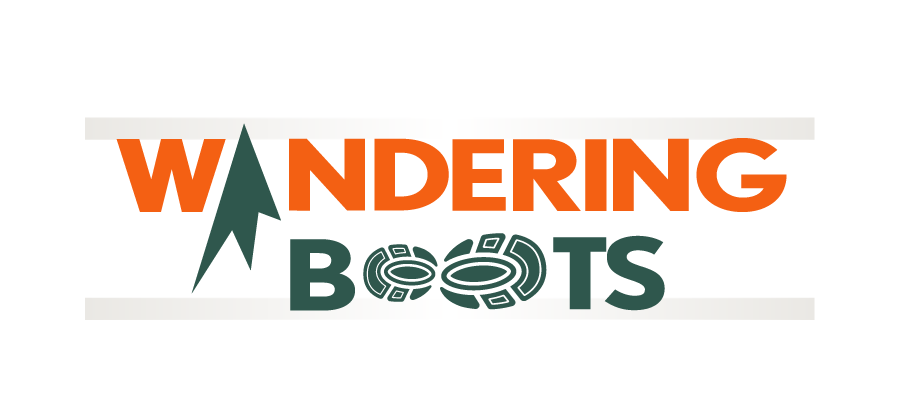
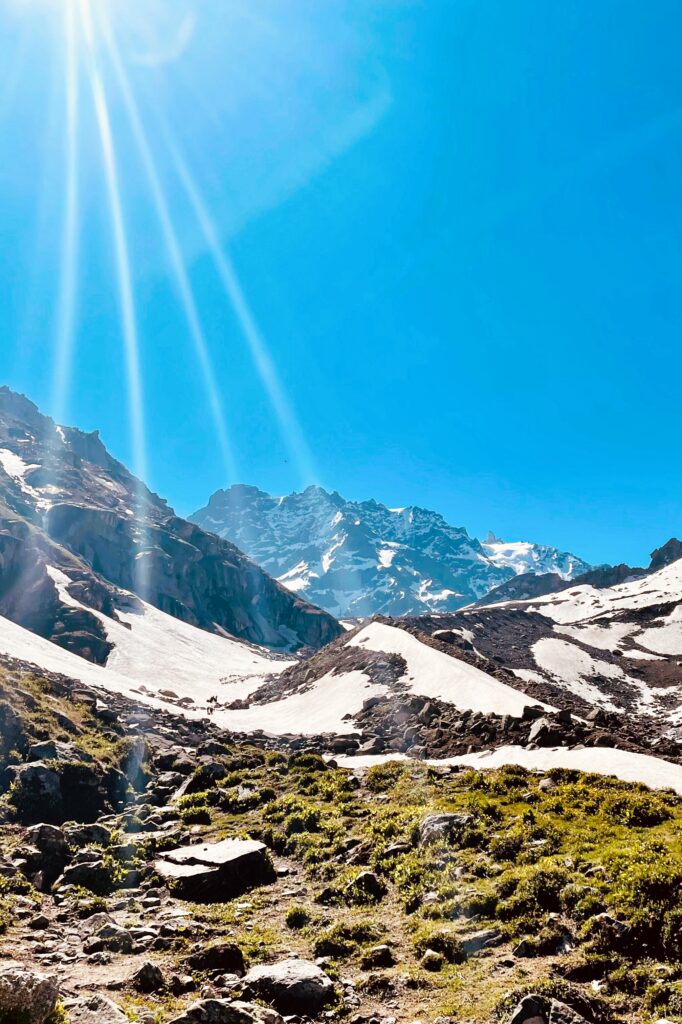
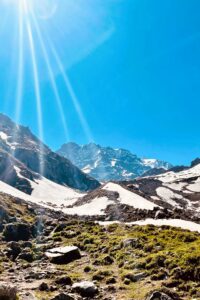
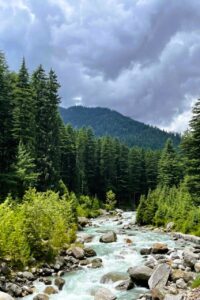
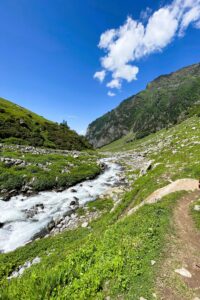
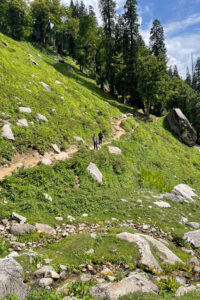
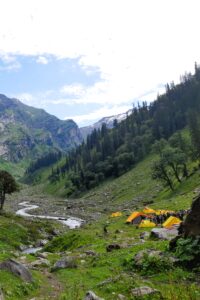
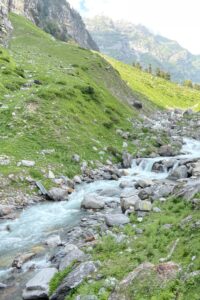
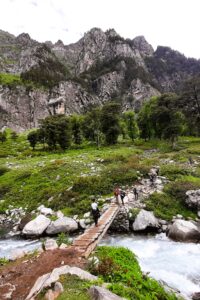
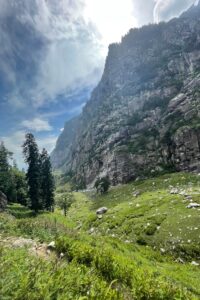
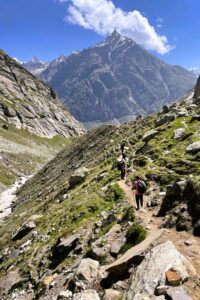
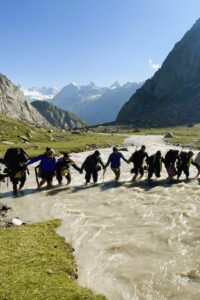
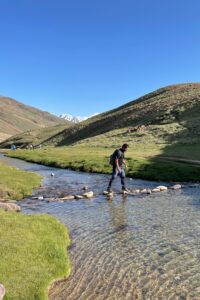
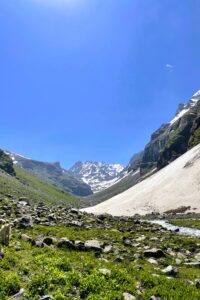
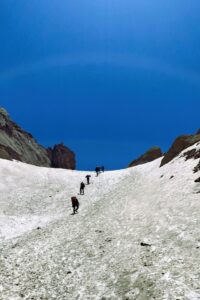
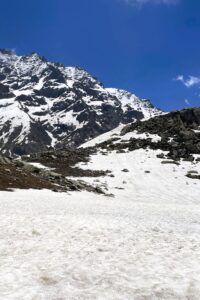
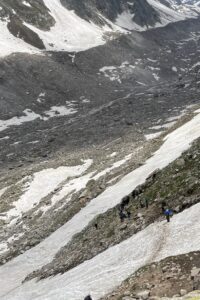
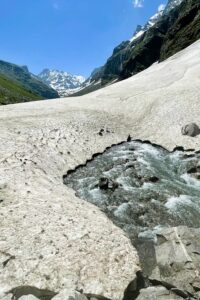
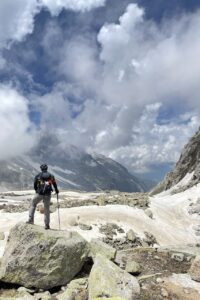
There are no reviews yet.